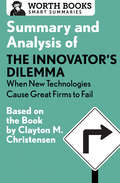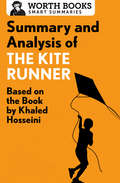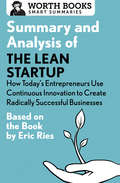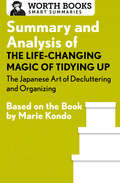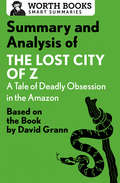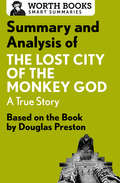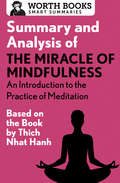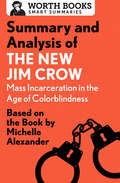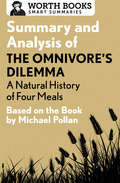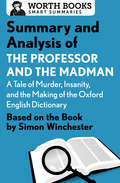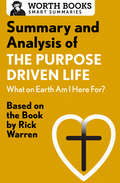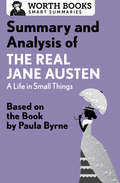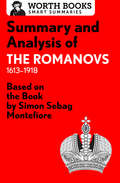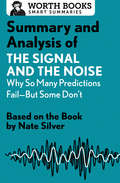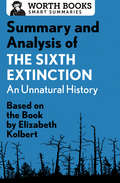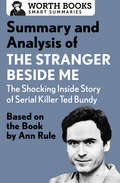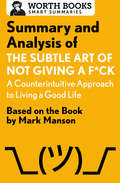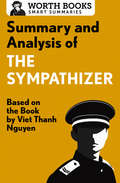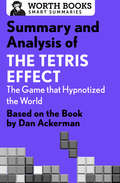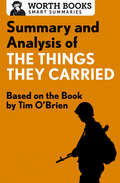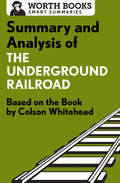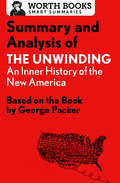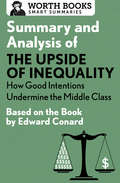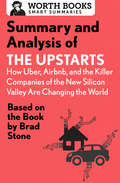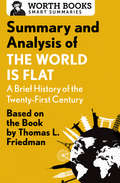- Table View
- List View
Summary and Analysis of The Innovator's Dilemma: Based on the Book by Clayton Christensen (Smart Summaries)
by Worth BooksSo much to read, so little time? Get a brief overview of The Innovator&’s Dilemma—the bestselling business book about disruption and how companies adapt. Named one of the most important business books ever written by the Economist and the winner of the Global Business Book Award, The Innovator&’s Dilemma uses true stories of the successes and failures of prominent companies to analyze why great firms fail when faced with critical market and technological innovation. In this summary of Clayton Christensen&’s book for entrepreneurs, managers, CEOs, and business leaders, you&’ll learn: Why sometimes &“doing the right thing&” can be the wrong thing, especially when faced with disruptive technologyWhy most companies, even good ones, struggle to adapt their business practicesWhat executives can do to ensure both the short-term health and long-term survival of their organizations With historical context, chapter-by-chapter overviews, important quotes, definitions of key terms, and other features, this summary and analysis of The Innovator&’s Dilemma is intended to complement your reading experience and bring you closer to a great work of nonfiction.
Summary and Analysis of The Kite Runner: Based on the Book by Khaled Hosseini (Smart Summaries)
by Worth BooksSo much to read, so little time? This brief overview of The Kite Runner tells you what you need to know—before or after you read Khaled Hosseini&’s book. Crafted and edited with care, Worth Books set the standard for quality and give you the tools you need to be a well-informed reader. This short summary and analysis of The Kite Runner by Khaled Hosseini includes: Historical contextChapter-by-chapter summariesAnalysis of the main charactersThemes and symbolsImportant quotesFascinating triviaGlossary of termsSupporting material to enhance your understanding of the original work About The Kite Runner by Khaled Hosseini: Khaled Hosseini&’s New York Times–bestselling novel is an epic and powerful story of love, unconditional support, and forgiveness. Chronicling the friendship of a boy raised with privilege and another living a life of servitude, the spellbinding tale spans thirty years of Afghanistan&’s troubled history—from the Soviet invasion to the days of Taliban control. With characters who demonstrate incredible loyalty, cruelty, and redemption, The Kite Runner is an astonishing testament to the strength and resilience of the human spirit. The summary and analysis in this ebook are intended to complement your reading experience and bring you closer to a great work of fiction.
Summary and Analysis of The Lean Startup: Based on the Book by Eric Ries (Smart Summaries)
by Worth BooksSo much to read, so little time? Get the key points of The Lean Startup—the bestseller about creativity, efficiency, and building a sustainable business. Through successes and failures with tech companies, Eric Ries began to realize there was a better way to develop a startup. Using his experiences, as well as valuable lessons learned from other industries, Ries identifies the difficulties a startup faces and how to build a more efficient—and successful—business. In the end, all of his advice comes down to saving the most important resource of all: time. This summary of that bestselling business book covers such topics as: How to shorten project-development cyclesValidated learning and rapid scientific experimentationMeasuring progress accuratelyIdentifying your customers&’ desiresHow to adapt to changing circumstances quickly With chapter-by-chapter overviews, definitions of key terms, context and analysis, important quotes, and other features, this summary and analysis of The Lean Startup is intended to complement your reading experience and bring you closer to a great work of nonfiction.
Summary and Analysis of The Life-Changing Magic of Tidying Up: Based on the Book by Marie Kondo (Smart Summaries)
by Worth BooksSo much to read, so little time? Get a brief overview of the Japanese KonMari method of organizing and take control of your life. Japanese cleaning consultant and New York Times–bestselling author Marie Kondo is known for the revolutionary method of organization detailed in her book The Life-Changing Magic of Tidying Up, which has helped millions create and keep tidy homes. With chapter-by-chapter breakdowns, this summary explains the key points of her book, including: How a calm, comfortable home can ease your mindWhy a &“little-by-little&” approach doesn&’t workHow to identify items that &“spark joy&” and dispose of those that don&’tHow to declutter your home by category Complete with historical context, important quotes, fascinating trivia, a glossary of terms, and other features, this summary and analysis of The Life-Changing Magic of Tidying Up is intended to complement your reading experience and bring you closer to a great work of nonfiction.
Summary and Analysis of The Lost City of Z: Based on the Book by David Grann
by Worth BooksSo much to read, so little time? This brief overview of The Lost City of Z tells you what you need to know—before or after you read David Grann’s book. Crafted and edited with care, Worth Books set the standard for quality and give you the tools you need to be a well-informed reader. This short summary and analysis of The Lost City of Z includes: Historical contextChapter-by-chapter overviewsProfiles of the main charactersDetailed timeline of key eventsImportant quotesFascinating triviaGlossary of termsSupporting material to enhance your understanding of the original workAbout The Lost City of Z: A Tale of Deadly Obsession in the Amazon by David Grann: Nearly a century after Colonel Percy Fawcett disappeared while on a quest to discover the mythical “Lost City of Z” in South America, New York Times–bestselling author David Grann set out to explore—first-hand—the terrain and history that have fascinated generations of explorers and scientists. Fawcett’s wild tales of flora, fauna, and indigeous peoples captivated the West, and his disappearance sent shockwaves around the world that continue to resonate today. David Grann’s book weaves the exciting stories of Colonel Percy Fawcett and his mysterious demise with an account of his own exploration of the Amazon. The Lost City of Z is now a major motion picture starring Robert Pattinson, Tom Holland, Charlie Hunnam, and Sienna Miller. The summary and analysis in this ebook are intended to complement your reading experience and bring you closer to a great work of nonfiction.
Summary and Analysis of The Lost City of the Monkey God: Based on the Book by Douglas Preston (Smart Summaries)
by Worth BooksSo much to read, so little time? This brief overview of The Lost City of the Monkey God tells you what you need to know—before or after you read Douglas Preston&’s book. Crafted and edited with care, Worth Books set the standard for quality and give you the tools you need to be a well-informed reader. This short summary and analysis of The Lost City of the Monkey God includes: Historical contextChapter-by-chapter summariesProfiles of the main charactersDetailed timeline of key eventsImportant quotesFascinating triviaGlossary of termsSupporting material to enhance your understanding of the original workAbout The Lost City of the Monkey God by Douglas Preston: Douglas Preston&’s The Lost City of the Monkey God is a gripping account of the search for a civilization lost in the impenetrable jungles of Central America. For centuries, legends of the White City—the City of the Monkey God—have infused Central American culture and fired the imaginations of explorers and adventurers worldwide. The conquistadores heard of this marvel, but were never able to penetrate the jungle to find it. Author and journalist Douglas Preston accompanies a team of filmmakers and archaeologists into the one of the deadliest jungles on the planet to rediscover a truly lost world. The summary and analysis in this ebook are intended to complement your reading experience and bring you closer to a great work of nonfiction.
Summary and Analysis of The Miracle of Mindfulness: Based on the Book by Thich Nhat Hanh
by Worth BooksSo much to read, so little time? This brief overview of The Miracle of Mindfulness tells you what you need to know—before or after you read Thich Nhat Hanh’s book. Crafted and edited with care, Worth Books set the standard for quality and give you the tools you need to be a well-informed reader. This summary and analysis of The Miracle of Mindfulness by Thich Nhat Hanh includes:Historical contextChapter-by-chapter summariesBreathing techniques and meditation exercisesImportant quotesFascinating triviaGlossary of termsSupporting material to enhance your understanding of the original workAbout Thich Nhat Hanh’s The Miracle of Mindfulness: In his introduction to the practices of mindfulness and meditation, Zen master Thich Nhat Hanh teaches how to live a more peaceful and fulfilling life. Under his guidance, simple tasks—such as drinking tea, peeling an orange, or washing the dishes—become opportunities to find fulfillment and happiness. Through uncomplicated instruction, breathing exercises, and wise stories, Hanh proves that living a more meaningful life is accessible to all. The summary and analysis in this ebook are intended to complement your reading experience and bring you closer to a great work of nonfiction.
Summary and Analysis of The New Jim Crow: Based on the Book by Michelle Alexander
by Worth BooksSo much to read, so little time? This brief overview of The New Jim Crow tells you what you need to know--before or after you read Michelle Alexander's book. Crafted and edited with care, Worth Books set the standard for quality and give you the tools you need to be a well-informed reader. This short summary and analysis of The New Jim Crow by Michelle Alexander includes: Historical context Chapter-by-chapter summaries Detailed timeline of key events Profiles of the main characters Important quotes Fascinating trivia Glossary of terms Supporting material to enhance your understanding of the original work About The New Jim Crow by Michelle Alexander: Legal scholar and civil rights lawyer Michelle Alexander's invaluable and timely work, The New Jim Crow, examines what she calls the new racial caste system in United States: mass incarceration. Following the practices of slavery and institutional discrimination, Alexander argues, mass incarceration is part of America's legacy to dehumanize and disenfranchise African Americans and Latinos. According to Alexander, "we have not ended racial caste in America; we have merely redesigned it." Thanks in a large part to the War on Drugs, more than two million people are in America's prisons today--an overwhelming majority of them are people of color who've been jailed for minor drug charges. When these adults leave prison, they are often denied employment, housing, the right to vote, and a quality education. As a result, they are rarely able to integrate successfully into society. The New Jim Crow is a well-argued call to dismantle a system of policies that continues to deny civil rights, decades after the passing of the Civil Rights and Voting Rights Acts. The summary and analysis in this ebook are intended to complement your reading experience and bring you closer to a great work of nonfiction.
Summary and Analysis of The Omnivore's Dilemma: Based on the Book by Michael Pollan (Smart Summaries)
by Worth BooksSo much to read, so little time? This brief overview of The Omnivore&’s Dilemma tells you what you need to know—before or after you read Michael Pollan&’s book. Crafted and edited with care, Worth Books set the standard for quality and give you the tools you need to be a well-informed reader. This short summary and analysis of The Omnivore&’s Dilemma includes: Historical contextChapter-by-chapter summariesProfiles of the main charactersDetailed timeline of eventsImportant quotesFascinating triviaGlossary of termsSupporting material to enhance your understanding of the original workAbout The Omnivore&’s Dilemma: A Natural History of Four Meals by Michael Pollan: In the perennial bestseller The Omnivore&’s Dilemma, acclaimed journalist Michael Pollan not only reports back from the frontlines of America&’s dysfunctional food industry, but gets down and dirty with the scrappy farmers and foragers who have decided to &“opt out&” of the industrial food chain. Informative, entertaining, and often alarming, The Omnivore&’s Dilemma examines dietary trends, the origins of what we eat, and the impact of our food choices on the environment and our health, and sheds desperately needed light on the saying &“you are what you eat.&” The summary and analysis in this ebook are intended to complement your reading experience and bring you closer to a great work of nonfiction.
Summary and Analysis of The Professor and the Madman: Based on the book by Simon Winchester
by Worth BooksSo much to read, so little time? This brief overview of The Professor and the Madman tells you what you need to know—before or after you read Simon Winchester’s book. Crafted and edited with care, Worth Books set the standard for quality and give you the tools you need to be a well-informed reader. This short summary and analysis of The Professor and the Madman by Simon Winchester includes:Historical contextChapter-by-chapter summariesDetailed timeline of key eventsImportant quotesFascinating triviaSupporting material to enhance your understanding of the original work About The Professor and the Madman by Simon Winchester: Simon Winchester’s The Professor and the Madman is the remarkable tale of two Victorian-era scholars, the English language, and the making of the Oxford English Dictionary. Recounting the unlikely bond between a criminally insane American Civil War veteran and the renowned Scottish editor of the OED, the enchanting story of their relationship illuminates the decades of the dictionary’s compilation—from A to Z. Wittily eloquent and historically incisive, The Professor and the Madman is the portrait of a friendship and, by extension, of the greatest dictionary ever created in the English language. The summary and analysis in this ebook are intended to complement your reading experience and bring you closer to a great work of nonfiction.
Summary and Analysis of The Purpose Driven Life: Based on the Book by Rick Warren
by Worth BooksSo much to read, so little time? This brief overview of The Purpose Driven Life tells you what you need to know—before or after you read Rick Warren’s book. Crafted and edited with care, Worth Books set the standard for quality and give you the tools you need to be a well-informed reader. This short summary and analysis of The Purpose Driven Life by Rick Warren includes: Historical contextChapter-by-chapter summariesKey scripture and inspirational quotesFascinating triviaGlossary of termsSupporting material to enhance your understanding of the original workAbout The Purpose Driven Life: What on Earth Am I Here For? by Rick Warren: With forty chapters devoted to forty days, Rick Warren’s bestselling The Purpose Driven Life: What on Earth Am I Here For? guides readers toward discovering their life’s purpose through a Christ-centered approach. Being successful and living out your purpose don’t always go hand in hand. Rick Warren’s wildly popular and life-changing book offers a transformational learning experience to help us become what God created us to be and live the lives we were meant to live. The summary and analysis in this ebook are intended to complement your reading experience and bring you closer to a great work of nonfiction.
Summary and Analysis of The Real Jane Austen: Based on the Book by Paula Byrne
by Worth BooksSo much to read, so little time? This brief overview of The Real Jane Austen tells you what you need to know—before or after you read Paula Byrne’s book. Crafted and edited with care, Worth Books set the standard for quality and give you the tools you need to be a well-informed reader. This short summary and analysis of The Real Jane Austen: A Life in Small Things includes: Historical contextChapter-by-chapter overviewsDetailed timeline of key eventsProfiles of the main charactersImportant quotesFascinating triviaGlossary of termsSupporting material to enhance your understanding of the original workAbout The Real Jane Austen by Paula Byrne: The Real Jane Austen forgoes the style of a conventional biography, and uses personal mementos as jumping-off points to explore the life of the celebrated author of Pride and Prejudice, Emma, and other classics of the British literary canon. The objects—a cocked hat, a vellum notebook, and a royalty check—illuminate various compelling aspects of Jane Austen’s life and personality. Although early biographies suggest she led a quiet, uneventful life, Austen was aware of the realities of the French Revolution, the slave trade in the West Indies, and the Napoleonic Wars, and she was influenced by the people and events of her day. Whether traveling throughout England or writing in the comfort of her home, the real Jane Austen was a complex and driven woman whose work has been loved for generations. The summary and analysis in this ebook are intended to complement your reading experience and bring you closer to a great work of nonfiction.
Summary and Analysis of The Romanovs: Based on the Book by Simon Sebag Montefiore
by Worth BooksSo much to read, so little time? This brief overview of The Romanovs tells you what you need to know—before or after you read Simon Sebag Montefiore’s book. Crafted and edited with care, Worth Books set the standard for quality and give you the tools you need to be a well-informed reader. This short summary and analysis of The Romanovs: 1613–1918 includes: Historical contextChapter-by-chapter overviewsImportant quotesFascinating triviaGlossary of termsSupporting material to enhance your understanding of the original workAbout The Romanovs by Simon Sebag Montefiore: Award-winning historian Simon Sebag Montefiore’s The Romanovs delves into the reign of the Romanovs, Russia’s most infamous ruling family, showing how the formidable clan rose to power and held on to it for more than three hundred years. In a sweeping chronological narrative of tsars and tsarinas, Sebag Montefiore’s well-researched biography details the drama that characterized Russia’s greatest dynasty, shedding light on the monarchs’ lives and actions. Beginning with Michael’s accession in 1613—marking the end of the Time of Troubles—and ending with the family’s tragic massacre in 1918, The Romanovs shows how generations of Russian tsars ruled autocratically, through violence, greed, and intrigue. The summary and analysis in this ebook are intended to complement your reading experience and bring you closer to a great work of nonfiction.
Summary and Analysis of The Signal and the Noise: Based on the Book by Nate Silver (Smart Summaries)
by Worth BooksSo much to read, so little time? This brief overview of The Signal and the Noise tells you what you need to know—before or after you read Nate Silver&’s book. Crafted and edited with care, Worth Books set the standard for quality and give you the tools you need to be a well-informed reader. This short summary and analysis of The Signal and the Noise by Nate Silver includes: Historical contextChapter-by-chapter summariesImportant quotesFascinating triviaGlossary of termsSupporting material to enhance your understanding of the original work About The Signal and the Noise by Nate Silver: Drawing on groundbreaking research, The Signal and the Noise, written by the founder and editor-in-chief of FiveThirtyEight.com, examines how data has been used in prediction and forecasting, and how to find the true signals—the points that indicate that something will happen—amidst noisy and distracting data. Addressing different fields of forecasting and predictions—from politics to earthquakes to poker—Silver explores the reasons why some things are easier to forecast, like the weather, while others are so difficult, such as terrorism. From one of the country&’s smartest thinkers. The Signal and the Noise provides vital insights into how to think about probability and predictions on the economy, climate change, sports, and other subjects that impact our lives. The summary and analysis in this ebook are intended to complement your reading experience and bring you closer to a great work of nonfiction.
Summary and Analysis of The Sixth Extinction: Based on the Book by Elizabeth Kolbert (Smart Summaries)
by Worth BooksSo much to read, so little time? This brief overview of The Sixth Extinction tells you what you need to know—before or after you read Elizabeth Kolbert&’s book. Crafted and edited with care, Worth Books set the standard for quality and give you the tools you need to be a well-informed reader. This short summary and analysis of The Sixth Extinction: An Unnatural History by Elizabeth Kolbert includes: Historical contextChapter-by-chapter overviewsDetailed timeline of key eventsImportant quotesFascinating triviaGlossary of termsSupporting material to enhance your understanding of the original work About The Sixth Extinction by Elizabeth Kolbert: Our planet has endured five events of mass extinction, from centuries of catastrophic heating and cooling to the asteroid that fell to earth and ended the Cretaceous Period. We are currently facing the sixth extinction, and this time the human species is to blame. Elizabeth Kolbert travels the world and meets with scientists who are grappling with the ecological outcomes of human activity. Her Pulitzer Prize–winning modern science classic tells the stories of thirteen different species that have already disappeared or are on the brink of extinction as a result of human activity. A captivating blend of research and historical anecdotes enlightens readers about the unintentional consequences of our behaviors, from climate change and global warming to invasive species and overexploitation. The summary and analysis in this ebook are intended to complement your reading experience and bring you closer to a great work of nonfiction.
Summary and Analysis of The Stranger Beside Me: Based on the Book by Ann Rule
by Worth BooksSo much to read, so little time? This brief overview of The Stranger Beside Me tells you what you need to know—before or after you read Ann Rule’s book. Crafted and edited with care, Worth Books set the standard for quality and give you the tools you need to be a well-informed reader. This short summary and analysis of The Stranger Beside Me by Ann Rule includes: Historical contextSection-by-section summariesDetailed timeline of important eventsImportant quotesFascinating triviaSupporting material to enhance your understanding of the original work About The Stranger Beside Me by Ann Rule: Among American serial killers, Ted Bundy is infamous not just for his crimes, but for the way he was able to charm his victims. Bundy’s friendly demeanor fooled many, including Ann Rule, bestselling true crime author and former law enforcement officer. Rule and Bundy met while working together at a suicide hotline. The two remained friends throughout the period of Bundy’s crimes, trials, and fight against execution. This friendship gives the reader an intimate window into a man countless psychiatrists struggle to explain. Get to know Ted Bundy, a true sociopath, and learn about his reign of terror in the Pacific Northwest, Florida, and perhaps beyond. Rule’s police background adds compelling perspective to one of the most popular, detailed, and personal books written about Ted Bundy. The summary and analysis in this ebook are intended to complement your reading experience and bring you closer to a great work of nonfiction.
Summary and Analysis of The Subtle Art of Not Giving a F*ck: Based on the Book by Mark Manson (Smart Summaries)
by Worth BooksSo much to read, so little time? This brief overview of The Subtle Art of Not Giving a F*ck tells you what you need to know—before or after you read Mark Manson&’s book. Crafted and edited with care, Worth Books set the standard for quality and give you the tools you need to be a well-informed reader. This short summary and analysis of The Subtle Art of Not Giving a F*ck by Mark Manson includes: Historical contextChapter-by-chapter summariesImportant quotesFascinating triviaSupporting material to enhance your understanding of the original workAbout The Subtle Art of Not Giving a F*ck by Mark Manson: In his tender but tough take on the self-help genre, popular blogger and accidental life coach Mark Manson makes a convincing case for caring less to achieve more. The Subtle Art of Not Giving a F*ck offers deeply insightful—and occasionally profane—advice by cutting through the crap and offering the honest, raw truth. Manson&’s program for self-improvement insists that by not being positive all the time, we can accept our limitations, embrace our fears, and live a grounded, truthful, and happy life. The summary and analysis in this ebook are intended to complement your reading experience and bring you closer to a great work of nonfiction.
Summary and Analysis of The Sympathizer: Based on the Book by Viet Thanh Nguyen (Smart Summaries)
by Worth BooksSo much to read, so little time? This brief overview of The Sympathizer tells you what you need to know—before or after you read Viet Thanh Nguyen&’s book. Crafted and edited with care, Worth Books set the standard for quality and give you the tools you need to be a well-informed reader. This short summary and analysis of The Sympathizer includes: Historical contextChapter-by-chapter overviewsProfiles of the main charactersThemes and symbolsImportant quotesFascinating triviaGlossary of termsSupporting material to enhance your understanding of the original workAbout The Sympathizer by Viet Thanh Nguyen: Viet Thanh Nguyen&’s Pulitzer Prize–winning book depicts the secret life of an unnamed Vietnamese man, grappling with various identities, whose story begins with the evacuation of Saigon, continues with his life living in America after the war, and ends with a shocking twist. Written in the form of a confession, this darkly humorous tale is a brilliant, long-overdue addition to the canon of immigrant literature. Part spy novel, part political thriller, and part satire, The Sympathizer offers smart, scathing, and timely commentary on the state of race, class, war, politics, and the media. The summary and analysis in this ebook are intended to complement your reading experience and bring you closer to a great work of fiction.
Summary and Analysis of The Tetris Effect: Based on the Book by Dan Ackerman
by Worth BooksSo much to read, so little time? This brief overview of The Tetris Effect tells you what you need to know—before or after you read Dan Ackerman’s book. Crafted and edited with care, Worth Books set the standard for quality and give you the tools you need to be a well-informed reader. This short summary and analysis of The Tetris Effect includes: Historical contextChapter-by-chapter summariesProfiles of the main charactersDetailed timeline of key eventsImportant quotesFascinating triviaGlossary of termsSupporting material to enhance your understanding of the original workAbout The Tetris Effect: The Game that Hypnotized the World by Dan Ackerman: In his book The Tetris Effect, Dan Ackerman provides an informative, intriguing account of the history of one of the world’s most popular video games. The surprising story begins in Soviet Russia, where computer researcher Alexey Pajitnov programmed the first version of Tetris using outdated software—before it spread westward and went viral. As the addictive game grew in popularity around the world, so did the fight for its ownership. Learn about the early days of Cold War–era computer programming, the people and companies who sought control of the intellectual property, and how playing Tetris physically impacts our brains. The summary and analysis in this ebook are intended to complement your reading experience and bring you closer to a great work of nonfiction.
Summary and Analysis of The Things They Carried: Based on the Book by Tim O'Brien
by Worth BooksSo much to read, so little time? This brief overview of The Things They Carried tells you what you need to know—before or after you read Tim O’Brien’s book. Crafted and edited with care, Worth Books set the standard for quality and give you the tools you need to be a well-informed reader. This Summary of The Things They Carried by Tim O’Brien includes: Historical contextStory-by-story summariesCharacter analysisThemes and symbolsImportant quotesSupporting material to enhance your understanding of the source work About The Things They Carried by Tim O’Brien: A New York Times Book of the Century and Pulitzer Prize finalist, The Things They Carried is a modern classic and an essential work of literature about the Vietnam War. Brilliantly blending fact and fiction, autobiography and imagination, Tim O’Brien draws on personal experience to tell the stories of a platoon of American soldiers sent to fight Vietnam. As they trek through jungles and across mountains, the young men of Alpha Company carry radios, assault rifles, C-rations, and good luck charms—as well as grief, love, terror, and the shame of cowardice. Most of all, they carry the dream of escape, not yet knowing that the burden of memory will haunt them long after the war is over. Taught in classrooms all over the world, The Things They Carried is a groundbreaking work of art that reveals the true nature of war and celebrates the healing power of storytelling. The summary and analysis in this ebook are intended to complement your reading experience and bring you closer to a great work of fiction.
Summary and Analysis of The Underground Railroad: Based on the Book by Colson Whitehead (Smart Summaries)
by Worth BooksSo much to read, so little time? This brief overview of The Underground Railroad tells you what you need to know—before or after you read Colson Whitehead&’s book. Crafted and edited with care, Worth Books set the standard for quality and give you the tools you need to be a well-informed reader. This short summary and analysis of The Underground Railroad by Colson Whitehead includes: Historical contextChapter-by-chapter summariesAnalysis of the main charactersThemes and symbolsImportant quotesFascinating triviaGlossary of termsSupporting material to enhance your understanding of the original work About The Underground Railroad by Colson Whitehead: Colson Whitehead&’s National Book Award–winning The Underground Railroad is a bold, original, and unflinchingly brutal portrait of slavery during the darkest period in American history. On the cusp of womanhood, Cora is a runaway slave, pursued by her memories of abuse and abandonment, and by the implacable and notoriously cruel slave hunter known as Ridgeway. Her journey on the Underground Railroad—in Whitehead&’s conceit, a literal, subterranean railway—propels her journey across a dangerous landscape in search of freedom. The summary and analysis in this ebook are intended to complement your reading experience and bring you closer to a great work of fiction.
Summary and Analysis of The Unwinding: Based on the Book by George Packer
by Worth BooksSo much to read, so little time? This brief overview of The Unwinding tells you what you need to know—before or after you read George Packer’s book. Crafted and edited with care, Worth Books set the standard for quality and give you the tools you need to be a well-informed reader. This short summary and analysis of The Unwinding: An Inner History of the New America includes: Historical contextChapter-by-chapter overviewsProfiles of the main charactersDetailed timeline of key eventsImportant quotesFascinating triviaGlossary of termsSupporting material to enhance your understanding of the original work About The Unwinding by George Packer: Detailing the United States’ decline in the latter half of the twentieth century, journalist George Packer’s The Unwinding reads like a memoir but contains the hard-hitting facts of an exposé. Packer’s history of America looks at a cast of interesting figures—from community organizers to laborers, Democratic Party staffers to small business owners—including household names such as Oprah Winfrey, Colin Powell, Raymond Carver, Jay-Z, and Elizabeth Warren, to produce a stunning portrait of what the United States has become and where it’s headed next. The Unwinding won the National Book Award, was a National Book Circle Award finalist, and was named by the New York Times as one of the best books to read to understand the Trump presidency. The summary and analysis in this ebook are intended to complement your reading experience and bring you closer to a great work of nonfiction.
Summary and Analysis of The Upside of Inequality: Based on the Book by Edward Conrad
by Worth BooksSummary and Analysis of The Upside of Inequality: How Good Intentions Undermine the Middle Class Based on the Book by Edward Conard So much to read, so little time? This brief overview of The Upside of Inequality tells you what you need to know—before or after you read Edward Conard’s book. Crafted and edited with care, Worth Books set the standard for quality and give you the tools you need to be a well-informed reader. This short summary and analysis of The Upside of Inequality includes: Historical contextChapter-by-chapter overviewsImportant quotesFascinating triviaGlossary of termsSupporting material to enhance your understanding of the original workAbout The Upside of Inequality: How Good Intentions Undermine the Middle Class by Edward Conard: New York Times–bestselling author Edward Conard argues in favor of an American economic system that results in massive income inequality. Breaking down the causes of inequality while dispelling many of the myths surrounding stagnating wages and financial disparity for the the lower and middle classes, Conard dismisses the call for wealth redistribution. He, instead, makes the case for lower taxes, less regulation of banks, restricted immigration, and lower trade deficits. The summary and analysis in this ebook are intended to complement your reading experience and bring you closer to a great work of nonfiction.
Summary and Analysis of The Upstarts: Based on the Book by Brad Stone (Smart Summaries)
by Worth BooksSo much to read, so little time? This brief overview of The Upstarts tells you what you need to know—before or after you read Brad Stone&’s book. Crafted and edited with care, Worth Books set the standard for quality and give you the tools you need to be a well-informed reader. This short summary and analysis of The Upstarts: How Uber, Airbnb, and the Killer Companies of the New Silicon Valley Are Changing the World includes: Chapter-by-chapter overviewsCharacter profilesDetailed timeline of eventsImportant quotesFascinating triviaGlossary of termsSupporting material to enhance your understanding of the original work About The Upstarts by Brad Stone: Brad Stone&’s The Upstarts: How Uber, Airbnb, and the Killer Companies of the New Silicon Valley Are Changing the World is a detailed account of the founding of Uber and Airbnb, as well as each company&’s climb from small startup to transportation and hospitality powerhouse. The Upstarts provides insight into the early lives of entrepreneurs Travis Kalanick and Brian Chesky, including their forays into new business ventures, some successful, most of them not. Stone points out the amazing parallels between the two tech companies as they fight for startup capital, wrestle to find the right framework for their products and organizations, and bring in the talent and technology needed to support those offerings. The summary and analysis in this ebook are intended to complement your reading experience and bring you closer to a great work of nonfiction.
Summary and Analysis of The World Is Flat 3.0: Based on the Book by Thomas L. Friedman (Smart Summaries)
by Worth BooksSo much to read, so little time? This brief overview of The World Is Flat: A Brief History of the Twenty-First Century tells you what you need to know—before or after you read Thomas L. Friedman &’s book. Crafted and edited with care, Worth Books set the standard for quality and give you the tools you need to be a well-informed reader. This short summary and analysis of The World Is Flat 3.0 by Thomas L. Friedman includes: Historical contextChapter-by-chapter summariesDetailed timeline of important eventsImportant quotesFascinating triviaSupporting material to enhance your understanding of the original work About The World Is Flat 3.0 by Thomas L. Friedman: Pulitzer Prize–winning author Thomas L. Friedman imagines himself a modern-day Columbus, exploring a new world created by a global economy. He travels from Bangalore to Bentonville, interviewing key figures in the rise of globalization, outsourcing, offshoring, and supply chain management. Like great explorers before him, Friedman spins tales of vast wealth and freedoms made possible by advances in technology. But here, too, there be dragons: foreign competition, educational failures, governmental incompetence, and the specter of 9/11 and terrorism are the ugly flip side of crowd-sourced technological wonders. The World Is Flat is an essential work for anyone interested in the impact of globalization. The summary and analysis in this ebook are intended to complement your reading experience and bring you closer to a great work of nonfiction.
